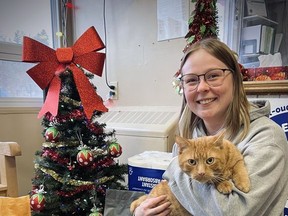
The rising cost of living means some families are having to choose between feeding their families or their pets.
Robin Kuchma, executive director of the Brant County SPCA, said the agency’s emergency food service has distributed 27,000 meals so far this year to those in need. That’s almost double last year’s demand.
The SPCA also supplies the Brantford Food Bank and Six Nations Food Bank and Animal Control with emergency dog and cat food.
Kuchma said rising costs mean it has becoming increasingly difficult for some people to fill their pet’s bowls.
Pet owners also face difficulties accessing vet care, she said.
“A shortage of veterinarians and increased veterinary care prices are affecting homes across Ontario,” said Kuchma in a recent media release. “There is an ongoing need for veterinary care for both pets in home and animals in shelters.”
The local SPCA recently began a collaboration with the Kim and Stu Lang Community Healthcare Partnership Program operated through the Ontario Veterinary College at the University of Guelph.
The SPCA is working with veterinarians through the program to “optimize shelter medicine care at our shelter.”
“Shelter medicine is very different from traditional housed-pet veterinary care,” said Kuchma. “Shelter medicine works to meet the unique needs of unhoused animals, like population-level infectious disease management and high-quality and high-volume spay/neuter surgery.”
Every animal that comes into the Brant SPCA undergoes a health check that determines what type of treatment they need prior to adoption. All receive vaccines, spay or neuter surgery, a microchip and a collar and tag.
The agency also operates a Pets for Life program, which supports animal lovers who can’t access conventional veterinary care. The Brant SPCA, through a collaboration with local veterinarians, recently began operating a mobile clinic, through the College of Veterinarians of Ontario. The Brant County SPCA is the only agency in Canada to be an accredited member of Pets for Life, founded by the Humane Society of the United States.
An SPCA community outreach team of staff and volunteers go into targeted, lower-income areas of the city where they knock on doors and forge relationships with pet owners.
“They get to know the residents and offer pet food, supplies, and veterinary care, like spay/neuter surgery, microchipping and wellness exams,” said Kuchma.
“For some, it the first time their animals have seen a vet. One of the main goals of the Pets for Life program is to keep families together and to prevent families from going through the trauma of having to surrender their pet due to the cost of pet care or high veterinary bills.”
Financial donations to the Brant County SPCA are always welcome. Other high-need items are dry cat food, kitty litter and laundry detergent.
The SPCA is currently located at 539 Mohawk St. in Brantford but there have been longstanding plans to build a new, much larger facility at 10 Kraemer’s Way.
Kuchma said the public phase of a fundraising campaign for the building will be launched next year.
